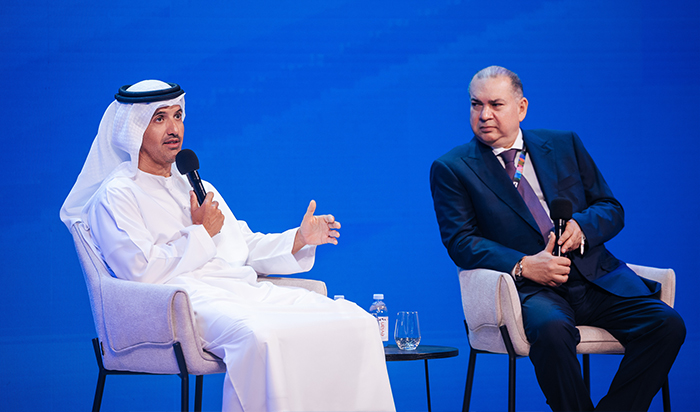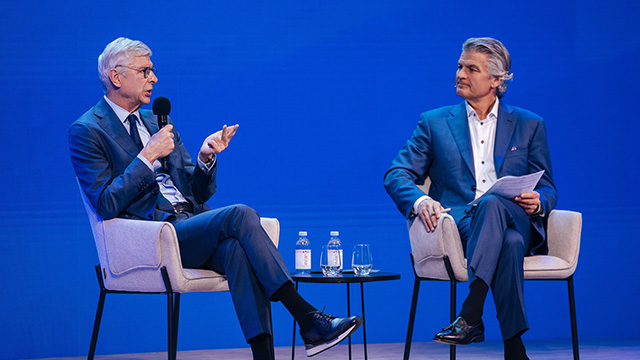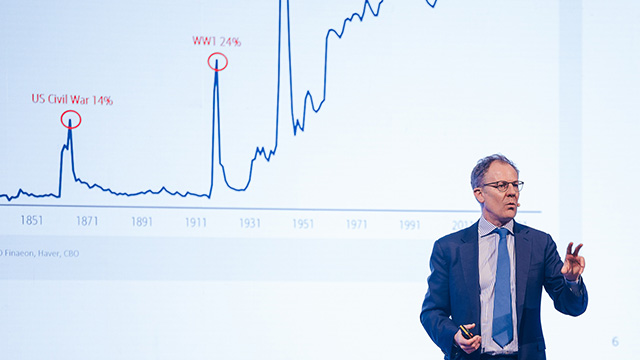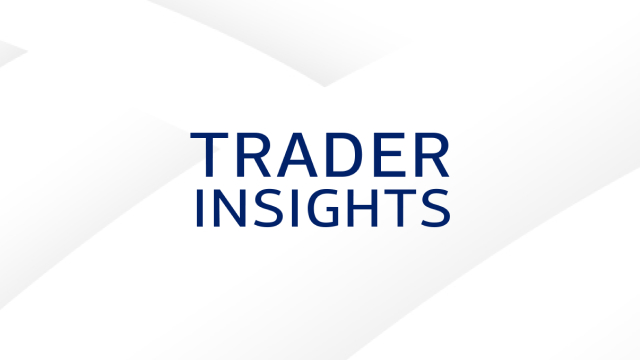Pearl in a storm: Dubai’s rise as a global hub

His Excellency Helal Saeed Al Marri, Director-General of the Government of Dubai’s Department of Economy and Tourism
Arshad Ghafur, President, Middle East & North Africa, Bank of America
Key takeaways
- The UAE’s largest city is experiencing an unprecedent boom in investment and immigration, as entrepreneurs, global corporations, and professionals increasingly perceive it as a beacon of safety and relative stability
- Policymakers cite ongoing dialogue with the private sector and proactive regulation, as the pillars supporting Dubai’s emergence as a global financial and technology powerhouse
- The Government of Dubai is focusing on quality of life to ensure the city continues to attract top-tier talent and capital
With the world bracing for protracted political, economic and market volatility, the lure of jurisdictions that manage to combine forward-thinking policy with predictability/stability will only grow. This dynamic is a key driver behind Dubai’s ascendancy as an international financial, investment and, increasingly, lifestyle destination. It also made the city the ideal host for the 2025 edition of the Bank of America Global Investor Summit, which brought industry leaders, investors and experts from across the global spectrum to what is becoming the world’s financial and trading hub of choice.
As Arshad Ghafur, Bank of America’s President for Middle East and North Africa, remarked in the summit’s opening session, which explored the Government of Dubai’s vision for the United Arab Emirates’ largest city, Dubai’s momentum is immediately palpable.
“A lot of you have chosen to base your businesses in Dubai,” he said to the executives assembled at the Summit. “A lot of you have chosen to relocate here with your families. And a lot of people who hadn’t been to Dubai before now assure me that they’re not going home!”
Joining Ghafur on stage was His Excellency Helal Saeed Al Marri, Director-General of the Government of Dubai’s Department of Economy and Tourism, who has played an integral role in the city’s development and strategic direction. According to Al-Marri, the roots of Dubai’s success are not recent, but the result of an open dialogue with the private sector that goes back decades.
“The consistency in policy and strategy that we’ve had over the last 30-40 years has built a degree of confidence in the business community,” he explained. “For businesses to have a clear path ahead is something that’s become rarer and rarer in today’s world.”
In conversations with the business community, Dubai’s Leadership have always sought to answer one main question: What comes next? Its current target is nothing less than becoming one of the top three cities globally, which Al-Marri identified as the main consideration driving policy direction and investment decisions.
This has concentrated efforts on fostering high-growth industries such as logistics, which has benefited from the city’s seamless infrastructure and, via state-owned DP World, a network of ports and logistics operations that spans the globe. The Emirate’s abundant solar energy – it will soon be home to the largest single-site solar park on the planet1 – is fueling a vibrant manufacturing sector. A pipeline of new attractions, retail and hospitality experiences has also boosted Dubai’s profile as a tourism destination, with the city ranking the world’s fourth-most visited last year.2
A rising force in finance
For all those successes, it is on finance that Dubai has built much of its recent fortune. As Ghafur pointed out, the performance of the Dubai International Financial Centre (DIFC), a 100-hectare zone established in 2004, has proven “truly phenomenal,” with Dubai emerging as the region’s leading financial hub and also gaining in global rankings.3
After significant growth in the capital markets and a strong influx of hedge funds, family offices, private equity and other industry players, Dubai is now attracting more interest from specialist fields like insurance and development finance. Helped by a supportive stance towards innovation and virtual assets, the city has also established itself as “one of the biggest fintech hubs globally,” home to over 140 fintech firms employing 2,000 people or more, Al Marri said. Over 50,000 professionals now work in the DIFC with this figure expected to double over the next decade.
Technology, both linked to the financial sector and in fields from artificial intelligence to life sciences, is another area Al-Marri sees accelerating.
“Dubai is becoming a hub for the late stage commercialisation of new technologies, where regulation, investment and talent come together,” Al-Marri noted. “We have the philosophy that people working in the sector will always know a lot more than us about regulation, and we try not to limit the environment, but to focus on working with the private sector to give it flexibility. That's been very positive in attracting the right talent.”
Retaining this talent depends not only on a conducive tax and regulatory environment, but ‘softer’ quality of life factors, Al-Marri noted – which is why the Government of Dubai is equally focused on areas like education, safety, health, and recreation.
“These things are a must, not just to attract people to live here, but for all of us,” he said.
Regardless of how global dynamics change, Al-Marri pointed to the speed and adaptability the city has demonstrated over the last few decades as the biggest predictors of its continued success.
“Dubai has developed this ability to be very nimble, very dynamic, and to really focus on implementation,” he said “I think that’s what’s key.”
1 Government of Dubai, "Mohammed bin Rashid Al Maktoum Solar Park"
2 Union of Arab Chambers, "Dubai Is Fourth In the List of Most Visited Cities In 2024", June 2024
3 Z/Yen, Global Financial Centres Index 37, March 2025
Lessons in leadership, from a master of sporting success
Whether you call it soccer or football, the world’s most popular team sport is a theatre of intense competition, extreme pressure and exceptional performance.


